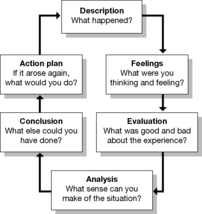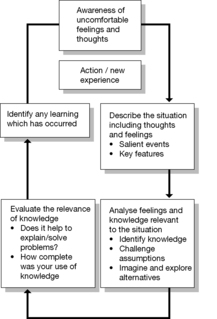Why reflection is so important
WHY REFLECTION IS SO IMPORTANT
When I finished my top-up degree, I didn’t ever want to even think about reflection. I felt like it was pushed down my throat – reflect, reflect, reflect … so for the first couple months of my new post I didn’t really think much about reflection. Then I noticed my standards were slipping – a student mentioned that I cut a lot of corners. I realised that my practice was going in the wrong direction and I needed to actively reflect on what I was doing. I’m back to regular reflection now. (qualified 2years)
As a community staff nurse, I work alone most of the time. It helps me to share my reflections with other people, especially my District Nurse Sister. It helps me know that I do things the same way other people do, and that what I am thinking and feeling is normal! Sometimes when you work on your own you can get really critical of yourself. (qualified 1year)
As a student nurse, you were expected to produce reflections to prove to your university tutors and your mentors that you were developing the insight and awareness you needed to become a nurse. As a qualified nurse, your focus changes slightly: reflection isn’t really about proving to others – it’s now about improving yourself because you want to.
As a nurse, you will make decisions without anyone really looking over your shoulder. This means that you have to rely on yourself and that inner voice to keep you doing the right things for the right reasons. It’s not about what you actually do so much as why you do it. Reflective practice gives you the opportunity to think about why you make certain decisions and do certain things.
Some come from your life outside nursing:
• your general knowledge
• your personality
• your attitudes
• your emotions and emotional health
• your physical health
• your religion and culture.
Some of the reasons you do things will come from places you aren’t really aware of:
• your memories of and experiences with people similar to your patient(s)
• past problems and hurt you have suffered
• your subconscious beliefs and needs
• your level of distraction and stress at the time of the interaction.
Everything you do is decided by elements from each one of these areas. Let’s look at an example:
Your friend asks you if you like her shirt. You make decisions at a conscious level – the style, the fit, the details. You know your friend is very style conscious and always works to look her best. You think about the question and what you want to reply.
But you also are also processing the encounter at an unconscious level. Your senses are gathering information without your active participation – what is your friend’s posture? Odour? What is her facial expression? Your mind is looking through past experiences and old memories looking for situations that match this one.
You might reply to your friend ‘It looks OK, I guess’. Not a very enthusiastic endorsement and certainly not the one your friend was hoping for. She asks: ‘Why? What’s wrong with it?’. You say you don’t know: it’s just something about the colour. You shrug. She pouts and walks away.
Your subconscious thoughts, memories and needs can all influence the way you behave and the decisions you make. Decisions strongly influenced by unconscious thinking might not be the best decision for your individual patients: most of the time, the things you think about in your subconscious are centred on you and getting your own needs met. As a nurse, you always have to put the patient’s needs first. That’s why you need to reflect: it’s not enough to make decisions based on what you are consciously thinking; you need to be aware of less conscious things that might influence you. You can only do that if you take time to think about your decisions. Everything you do as a nurse must be, as much as possible, motivated by your nursing knowledge and skill.
Of course, with experience, you will develop nursing skills and intuition at a subconscious level. You can trust that part of your subconscious a bit more (there is more about intuition in Chapter 3) but you still have to be certain that you always do the right things for the right reasons.
That’s why reflection is so important: it helps you look at the reasons you do things so you can identify those times and situations when you must work to override subconscious things. You might think that would be very difficult, but you have already done it: a nurse cleans up faeces and other unpleasant bodily fluids, but without a reaction. You have already learned to ignore the little voice that says ‘I don’t want to touch that!’. You also learned to ignore the subconscious reaction that would make your face turn into the ‘oh that smells bad’ look. You learned to override the instincts and subconscious reactions.
There is something else for which reflection is very valuable: research says that once you learn the basics of something, you go onto more complex things. That makes sense, right? But, once you go onto more complex things you stop paying attention to the basics to the same degree as you did before. This means that your practice in those basic, fundamental areas can start to slip. This concept is called ‘entropy’.
Entropy is actually a concept in physics: it means that something will tend to increase in disorder unless something acts to prevent it. A good way of understanding this is to think of your house: if no one tidies up, it gets messier. That’s entropy – it becomes increasingly disorganised and cluttered until someone decides to do something to put it back the way it belongs.
Reflection helps you to do the right things for the right reasons. To truly be effective, your reflection should not just be after the fact. With time and practice, you can use reflection to help you guide decisions as you make them. This is called reflection in action.
REFLECTION IN ACTION AND REFLECTION ON ACTION
Reflection on action
You will be familiar with reflection on action – it’s the kind you practised in your nurse education. It’s a formal, written process that uses one of those familiar frameworks, like those of Johns or Gibbs. Before going on to reflection in action, let’s take a minute to review those models; you are probably already familiar with these:
Gibbs’ model (1988)
 |
Johns’ model (1994)
In each of these models, you think about an event after it happened. That’s what reflection on action is – sitting with your thoughts and experiences and sorting out what you did and what you would do next time.
But sometimes when you reflect you will find yourself thinking ‘Why didn’t I just do this instead of what I actually did?’. There are times that you need to work out what to do, not afterwards, but while you are doing something. This is called reflection in action.
Reflection in action
As soon as you realise you need to think about something, stop and think about it.
I can hear you thinking ‘How am I supposed to get anything done if I am always stopping?’. You have a point – but when I say stop, I don’t mean to grab a cuppa and sit at the nurses’ station. I mean to interrupt your train of thought and look at what you are thinking and feeling at that moment. As an example:
I visited Mrs Kaur to change the dressing on her left leg; the right one was only changed once a week and another community nurse had done it 2days ago. I was packing up to go when I suddenly realised that I felt a little uncomfortable, but didn’t know why. I almost pushed the feeling away but decided to think about it for a minute. I realised I didn’t feel right about the dressing on her right leg. I unwrapped it and checked it – as soon as I opened the bandages a strong odour hit me. Mrs Kaur sheepishly admitted that it really itched, so she had shoved a knitting needle into the bandage to scratch. There was a nasty infected wound. I don’t know why I felt uncomfortable, perhaps I had noticed the odour without realising it, but I’m glad I listened to myself. (community staff nurse)
If you think your basic skills won’t slip, think of this: statistically, the basic, most common and most fundamental tasks erode most quickly. Because you are so comfortable and confident about them, you stop paying so much attention to them and they break down.
Reflection in action is a key part of critical thinking: if you train yourself to also question, you are training yourself to always think about what you are doing. That brings us to a second point:
Just because you have always done something a certain way doesn’t mean it is still the right way to do it.
When you do stop and review what you are doing, take time to think if there is anything new that would influence your decision and actions. Here’s an example:




Amira is a community nurse. She goes into Mrs Bibi’s home once a week to wash her legs, assess them for any ulcers and to reapply compression bandages. In the 18months she has been doing this she has left aqueous cream on the skin after she finished washing.
Amira realises that she had read something about using aqueous cream and leaving it on the skin. Before she was next scheduled to visit Mrs Bibi, she spoke with the district nurse, who hadn’t heard anything about it. But Amira was sure there was something – a little voice in her head encouraged her to not let the matter drop. So she did a little research and she found evidence that says aqueous cream should be washed off the skin, not left on, as it can contribute to some skin conditions.
Stay updated, free articles. Join our Telegram channel

Full access? Get Clinical Tree


Get Clinical Tree app for offline access

